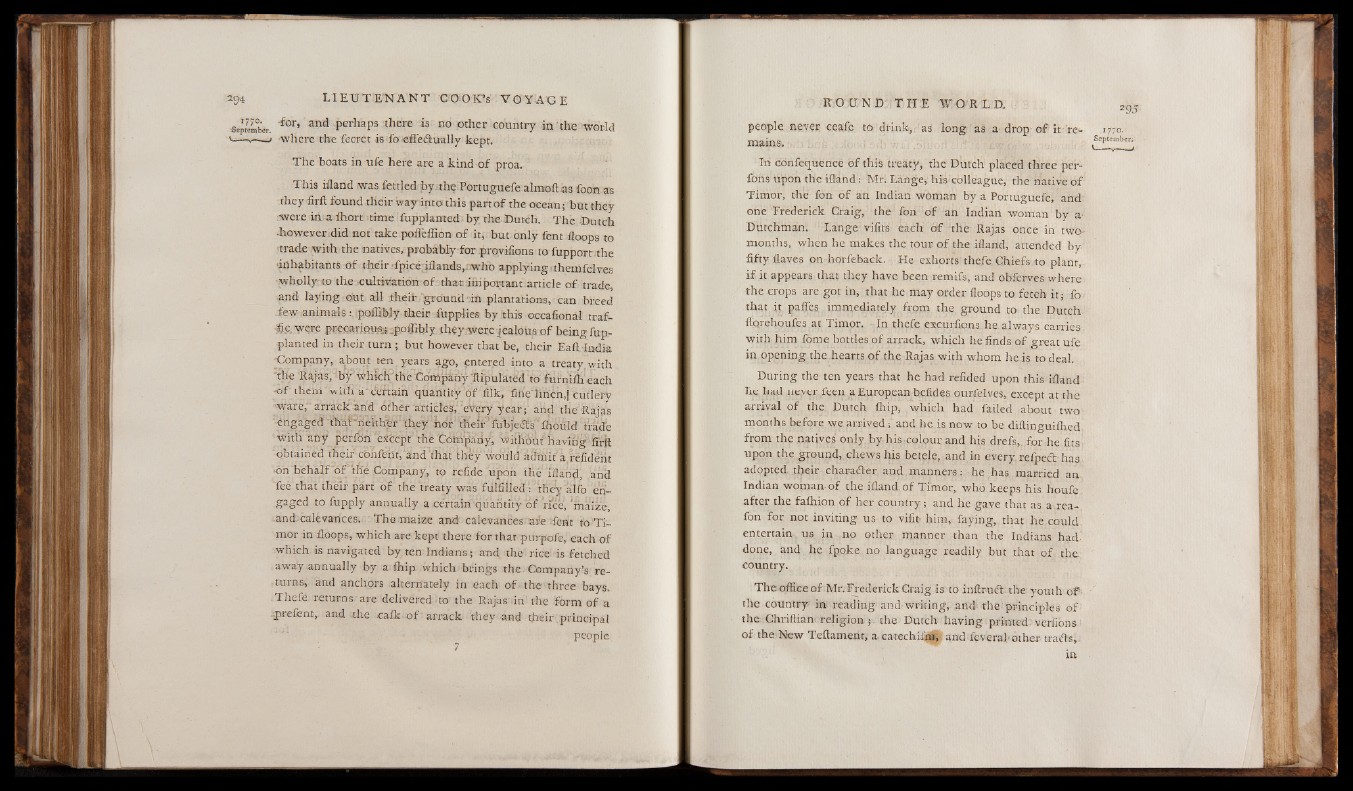
somber. T erhaPs -*<»6 is no other country in the world
------ where the fecret is To effectually kept.
The boats in ufe here are a kind of proa.
This iiland .was fettled jbynhePortuguefe almoft.as foon as
they firft found their wayintothis part of the ocean; but they
-were in a fliort: time fupplanted by the Dutch. The .Dutch
-however did not take poffeflion of it, but only fent Hoops to
trade with the natives, prabably-for provifions to fupport the
inhabitants df their Tpics;iflands,nwho applying >themfelves
■ whollyrto the -cultivation of. thaioiftipoytanf article of trade,
and laying out all their ground >m plantations, can breed
few animals: poliibly their fupplies by this occafional traf-
hc were presarifms» .poffthly ,they:wece j ealous of being fup.-
plahted in their turn ; but however that be, their Eafl India
Company, about ten years ago, entered into a treaty, with
'the Rajas,'‘by'whkh'the Company 'ftipulatcd to furnifli each
W , Aem with a" Certain quahtitf'6'f Tilk, finVlmlii,jcuflefy
ware," arrack and other articles,yeWry year; and the'Rajas
y«hgagfd W p f ; they1;hdr t&efc3|ubje^fs :Urbiii'ld trad’e
'wjtn •any peflfen 'exfidpr the Gohipany, witiiodt^liavihgifiril;
obtained their con.fenf,‘and 'that they would fefideht
oil behalf‘of tlie Company, to refide upon the ‘ifland, and
Tee that their part of the‘treaty was fulfilled : th’dy alfo engaged
to fupply annually a certain quantity of nee, 'maize,
.and.calevances. The maize and ca'.cvances are lent to'Ti-
mor in hoops, which are kept there for that purpof®, each of
which is navigated by ten Indians; and the rice is fetched
away annually by a fhip which brings the Company’s returns,
and anchors alternately in each of-the-three bays.
.Thefe returns are 'delivered--to' the Raja».in’ the form of a
.prefent,. and -the cafk-of arrack they and their .principal
people,
people never ceafg to drink,, as long as a. drop of it- re- 1770.
mains. j. 1 ■ ■ :. /)i: a j .■ .SeP*emb” ;
In confequence of thk treaty, the Dutch placed three per-
fons upon the iflahd: Mr! Lange; his colleague, the native o f
Timor, the fon of an Indian woman by a Portuguefe; and
one Frederick Craig, the fon of an Indian woman by a
Dutchman. Lange vifits each of the Rajas once in two-
months, when he makes the tour of the ifland, attended by
fifty flaves on horfeback. He exhorts" thefe Chiefs--to plant,,
if it appears that they have been remifs, and obferves where
the crops are got in, that he may order Hoops to fetch it; fo
that it paffes., immediately from the ground to the Dutch
ftqrehoufes at Timor. In thefe excurfions he always, carries-
with him fome bottles of arrack, which lie finds of great ufe
in opening the hearts of the Rajas with whom heis to deal.
During the ten years that he had refided upon this ifland
he had nev^- feen a Europeanbcfides ourfelves, except at the
arrival of the Dutch fliip, which had failed about two
months before we arrived ; and he.is now to be diflinguilhed.
from the natives only by-his-colour and his drefs,..for he fits-
upon the ground, chews his betele, and in every refpedt has
adopted their character and manners: he has married an
Indian woman of the ifland of Timor, who keeps his houfe
after the falhion of her country.; and he gave that as a rea-
fon for not inviting us to vifit- him, faying, that he could
entertain us in no other manner than the Indians had
done, and he fpoke no language readily but that of the
country.
The office of Mr. Frederick Craig-is to inflruct the youth of'
the country' in reading and writing, and the principles of
the Chriftiam religion the Dutch having printed. verfions:
o f the New Teftament, a. catechif«!, and fcveralother tracks,.
in